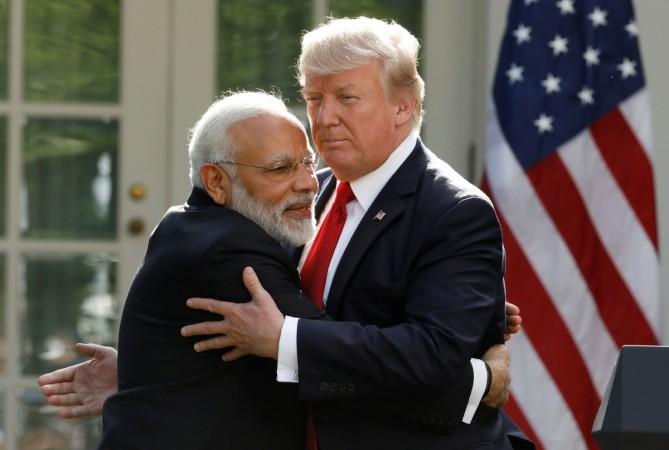Donald Trump’s team was not tested for corona virus when it arrived in India: MEA
 NEW DELHI : US President Donald Trump’s team was not tested for corona virus when it arrived in India said the external affairs ministry (MEA). The team of United States President Donald Trump was not tested for corona virus when it arrived in India in February.
NEW DELHI : US President Donald Trump’s team was not tested for corona virus when it arrived in India said the external affairs ministry (MEA). The team of United States President Donald Trump was not tested for corona virus when it arrived in India in February.
The ministry explained that Donald Trump’s team was not tested for the corona virus as the World Health Organization (WHO) declared the disease a pandemic only on March 11, while the United States’ President had visited India on February 24-25th.
“The Trump team was not required a corona virus test during its visit to India because the WHO declared this [Covid-19] a pandemic on March 11, while they visited India on 24-25th February,” the MEA said, replying to a question by MP Binoy Viswam in the Rajya Sabha.
The ministry also said that the screening of international passengers began from March 4. “Standards, protocols were followed during Donald Trump’s visit,” MEA said.
Prime Minister Narendra Modi has visited 58 countries since 2015 at a total cost of Rs 517 crore, the government said Tuesday in a written response to a question raised in the Rajya Sabha.
Minister of State for External Affairs V Muraleedharan said the Prime Minister had visited the United States and Russia the most – five visits each. PM Modi has also visited China – with whom India is engaged in a prolonged and serious border stand-off in eastern Ladakh – five times, he added.
Among other countries visited by the Prime Minister are Singapore, Germany, France, the United Arab Emirates and Sri Lanka, Mr Muraleedharan said.
“The total expenditure on these visits was Rs 517.82 crore,” he said, PTI, noting that while some of the visits were part of multi-nation trips, others were standalone bilateral visits.
The Prime Minister’s last trip abroad was to Brazil (in November last year) to attend a BRICS (Brazil, Russia, India, China and South Africa) summit. He also visited Thailand earlier that month. PM Modi has made no visits in 2020 because of the global lock down over the corona virus pandemic.
Muraleedharan told the parliament the visits had enhanced other countries’ understanding of India’s perspectives on bilateral, regional and global issues.
The visits also helped strengthen economic relations across a wide range of sectors, including trade and investment, technology, defence collaboration and people-to-people contact, the minister said.
However, in December 2018 the government said over Rs 2,000 crore had been spent on the PM’s foreign visits since June 2014 – these, it said, included expenses on chartered flights, maintenance of aircraft and hotline facilities.
According to the data (shared by then Minister of State for External Affairs VK Singh), a total of Rs 1,583.18 crore was spent on maintenance of the Prime Minister’s aircraft and Rs 429.25 crore on chartered flights during the period between June 15, 2014 and December 3, 2018. The total expenditure on hotline was Rs 9.11 crore.
Before the national election in April and May last year, Rahul Gandhi targeted PM Modi for travelling abroad while there was a crisis in the farm sector. PM Modi’s BJP eventually swept the national election, cementing his term for another five years.
Some of the visits the prime minister undertook were multi-nation trips while some were standalone bilateral visits. Modi’s last trip was to Brazil on November 13-14 in 2019 where he attended a summit of influential grouping BRICS (Brazil-Russia-India-China-South Africa).
Muraleedharan said Modi’s visits to the countries have enhanced their understanding of India’s perspectives on bilateral, regional and global issues.He said the visits helped in strengthening India’s relations with the countries in a wide range of sectors including trade and investment, technology, defence collaboration and people-to-people contact.
“These, in turn, have contributed to India’s national development agenda to promote economic growth and well being of our people,” the minister said.
“India is now increasingly contributing to shaping the global agenda at the multilateral level including on climate change, trans-national crime and terrorism, cyber security and nuclear non-proliferation, and offering to the world its own unique initiatives for global issues like the International Solar Alliance,” he added.
To a separate question on Nepal, Muraleedharan said India’s age-old ties with the neighboring country are “unique and special”, based on shared history, geography, culture, close people to people ties, mutual security and close economic linkages.
Asked whether the government is aware that Nepal has signed a number of transit and transportation treaties with China in the past few years to shrug off its dependence on India, he said New Delhi’s ties with Kathmandu stand on their own merit.
“Two thirds of Nepal’s global trade is with India and over 90 per cent of Nepal’s third country import-export transit is through India. India’s ties with Nepal stand on their own merit, and are independent of Nepal’s relations with third countries,” he said.
India’s ties with Nepal came under strain after the Himalayan nation came up with a new political map in May showing Lipulekh, Kalapani and Limpiyadhura in Uttarakhand as its territories. India maintains that these areas along the border with Nepal in Uttarakhand belong to it.
(With pti Inputs ).

